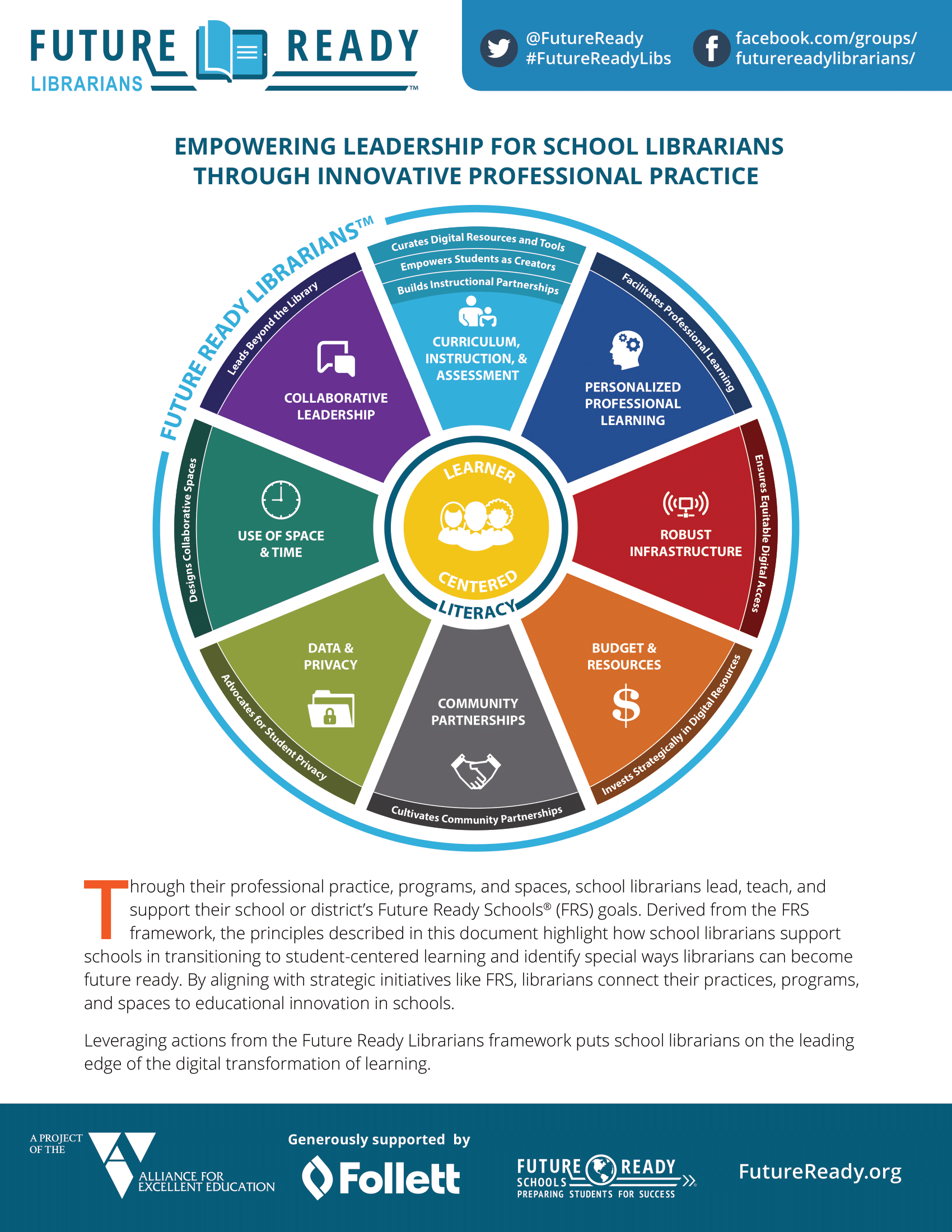Issue 113
Term 2 2020
What is a future ready librarian?
Mark Ray discusses the Future Ready Librarians initiative and how it is helping librarians build understanding, professional capacity and visibility as leaders in schools.
Librarians of the past or future?
In my 2016 TEDx Talk, Changing the conversation about librarians, I suggested that we are good at associating librarians with our past, but may not be as clear about their role in the future. Later that same year, Future Ready Librarians launched in the United States as part of the larger Future Ready Schools initiative that focuses on promoting innovation in schools and educational systems.
Over the last four years, the Future Ready Librarians initiative has changed the conversation about the role of school librarians and the ways in which they lead, teach, and support student learning. To date, the initiative has both clarified strategic roles for school librarians and also engaged and empowered the librarian community to build understanding, professional capacity and visibility as leaders in schools.
Most importantly, the Future Ready Librarians Framework translates well. Rather than competing with other standards or professional guidelines, it offers simple and concrete ways for librarians to align their practice to help solve the same challenges faced by school and district leaders. And while Future Ready Schools began in the Obama White House, the challenges of meeting the needs of future learners is, and always has been, universal.
Strategic focus
As a teacher librarian for 20 years and then as a district leader overseeing libraries for another seven years, I have always believed in aligning library practices and programs with ‘what keeps administrators up at night’. When librarians understand and can respond to the strategic needs of schools and systems, it creates win-win opportunities that benefit both students and teachers.
While Future Ready Schools began in the Obama White House, the challenges of meeting the needs of future learners is, and always has been, universal.
In 2012, I was asked to join a Follett initiative called Project Connect, which was focused on the future of school libraries. It started by asking superintendents, district leaders, and library leaders from across the US this: 'Is there a place for school libraries and librarians in a 21st-century school?'
Considering that many school districts across the US both then and now are reducing or eliminating school library programs, the answer was nowhere far from certain. But consensus was quickly found. Yes, there is a role for librarians and libraries. And that future looks different than the past.
Future Ready Schools White House launch
Future Ready Schools was launched at the White House in 2014. With a focus on the future, President Obama challenged a room full of national school leaders to take the Future Ready Pledge, a commitment to lead innovation in their educational systems. A partnership between the US Department of Education and the non-profit Alliance for Excellent Education created the Future Ready Schools Framework, which is based on research-derived ‘gears’ that help define what and how to promote change to meet the needs of future learners.
Future Ready Librarians Framework
Future Ready Librarians was formed in 2016 and has become a runaway success. The development of the Future Ready Librarians Framework identified specific ways in which librarians could support — as well as teach and lead — strategic work in schools. Based on the same gears and language used by district leaders, the framework offers specific examples of ways in which librarians can align their practice with school and district priorities.

The Future Ready Librarians Framework
Why the Future Ready Librarians Framework works
Below are two reasons that the Future Ready Librarians Framework has resonated — alignment and simplicity.
- First, because the framework is based on the same research and strategic focus used by superintendents, it puts librarians literally on the same page as school and district leaders.
- Second, the framework is simple. It is equally accessible to librarians and leaders, offering examples of ways in which librarians can support the future ready goals of schools.
A thriving Future Ready Librarian engages, connects
After Future Ready Librarians launched in the summer of 2016, it has thrived both in the librarian community and beyond. For many librarians, it has offered an opportunity to reimagine and rebrand their practice in new ways.
Speaking from experience, being a librarian in a school can be professionally lonely and isolating. While librarians are part of the learning community of their schools, they often must look beyond their schools for communities of practice, professional learning, and support.
When librarians understand and can respond to the strategic needs of schools and systems, it creates win-win opportunities that benefit both students and teachers.
To meet that need, Future Ready Librarians has created new opportunities to connect and learn with like-minded professionals: Future Ready institutes, online communities on Facebook and Twitter, webinars, professional development (including an online International Society for Technology in Education partnered course for emerging leaders), and micro-credentialing for librarians who promote student creativity.
Other tools are to come: a self-reflection tool and a step-by-step collaboration guide. Look for launch updates at futureready.org/librarians.
In the few short years since its launch, our shared future appears hotter, smokier, wetter, less civil, less factual and more challenging in almost every way. And yet I’m an optimist. Why? Because as a librarian and educator, I have seen schools and systems recognise the need to plan for a different future than existed in the past. And Future Ready Librarians are part of those solutions.
Image credits
Image supplied by Mark Ray